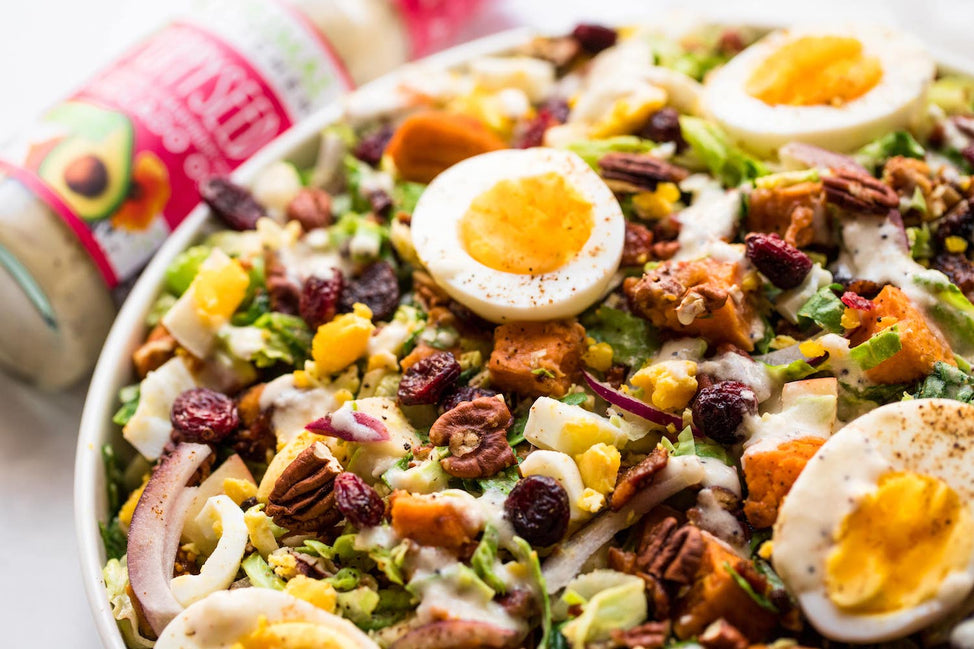There’s a lot of talk about eating “real food” these days. But what does that even mean? When we say that Primal Kitchen products are made for real food, we mean whole foods that remain as close to their natural state as possible. We’re talking unprocessed or minimally processed items without a laundry list of unpronounceable ingredients — basically, anything that your great-grandmother would recognize as food.
Real foods are typically the items located on the outer perimeter of most grocery stores; examples include fresh fruits, vegetables, meats, fish, and dairy. But some real foods are also found in the inner aisles, such as nuts, seeds, whole grains, and oils with good fats (like avocado oil). Real, whole foods contain a variety of nutrients, fats, and other essentials to help support your overall health and well-being.
Primal Kitchen's mission is rooted in the belief that food should be real and delicious. All of our sauces, condiments, and dressings are made from honest, high-quality ingredients that bring out the best in every dish. We believe real food is worth celebrating, and our products are intentionally crafted to make them even more enjoyable to eat.

What Are Ultra-Processed Foods?
Ultra-processed foods vary greatly from their natural state and may contain additives, preservatives, artificial flavors and colors, refined oils, added sugar or corn syrup, and bleached wheat flour. Take a look at the ingredients list in your favorite bag of potato chips, a pre-made loaf cake, or a typical bottle of BBQ sauce, and you're probably looking at ultra-processed food.
There’s a reason why people typically crave chips or cake, not broccoli. Ultra-processed foods are designed to be palatable and pleasurable, increasing your cravings for them. Many of them are also more convenient to make, offering a shortcut to flavor that you can’t usually get without making something from scratch.
Processing isn’t necessarily a bad thing, and in some cases, it can be beneficial (think wine, cheese, or yogurt). But with a Primal lifestyle, simplicity is the key to optimal wellness. We believe in the value of keeping real foods like vegetables, fruits, and meats as close to nature as possible. Primal Kitchen’s range of sauces, condiments, and dressings elevate real food, adding flavors that make it even more delicious without artificial sweeteners, modified food starch, or nonsense.
Are Frozen Vegetables and Fruits Considered Ultra-Processed Food?
In most cases, no. Freezing and other types of preservation like fermenting aren't what we mean when we talk about heavily processed and altered foods. Both fresh and frozen produce are great options for adding nutrients and color to your plate. Many companies harvest fresh fruits and vegetables at peak ripeness and flash-freeze them to preserve the nutrients. Look for frozen foods from trusted brands that take this type of extra care with their produce, and choose organic if that’s something that you and your family strive for.

What Is the Real Food Movement?
The idea of eating real, unprocessed food isn’t new: it’s how our ancestors ate for centuries. Then came the rise of processed foods around the 1950s, when food production began focusing more on convenience, long shelf life, and mass production than nutritional value. The popularity of processed foods took off, leading to ultra-processed options becoming everyday staples.
Starting in the 1980s, a growing awareness of health and diet concerns led people to question the overconsumption of processed foods, sparking what we now call the Real Food Movement. The term “real food” became widespread with the publishing of Nina Planck’s book Real Food: What to Eat and Why, which highlighted the benefits of returning to simpler, more natural ingredients.
At Primal Kitchen, we are proud to be a part of this movement, advocating for food that nourishes the body and is free of unnecessary additives.

How Real Food Impacts Children
If asked which restaurant chain is the largest in the nation, you might name a popular fast-food burger joint. In reality, America’s biggest restaurant is actually our school lunch program. Unfortunately, for reasons of cost and practicality, many school cafeterias rely on ultra-processed foods designed for quick preparation and a long shelf life. This can lead children to develop a taste for processed options, making it more challenging to get them to eat real food.
At Primal Kitchen, we believe that real food can change the world. Together with the nonprofit organization Eat Real, we’re revolutionizing how children eat in schools nationwide. Through our $1 million donation over a two-year period, Primal Kitchen is supporting Eat Real's mission to bring real, nutritious food into school cafeterias.
Their nonprofit certification program guides schools in adopting real food practices, impacting meal quality with 10 evidence-based standards that ensure nutritious choices. With this partnership, the goal is to reach one million students and improve up to 360 million school meals by 2025. This shared vision brings us closer to a future where kids enjoy better quality, healthier meals every day.


